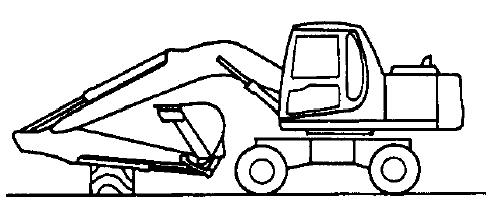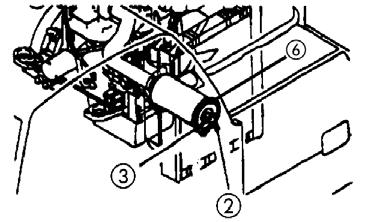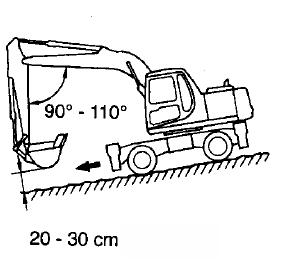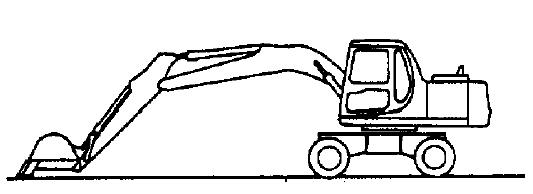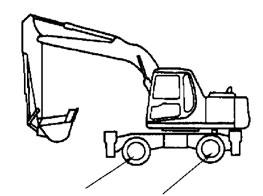
8 minute read
GENERAL PRECAUTIONS
WARNING: For reasons of safety, always follow these safety precautions..
SAFETY RULES
ONLY trained and authorised personnel can operate and maintain the machine.
Follow all safety rules, precautions and instructions when operating or performing maintenance on the machine.
When working with another operator or a person on worksite traffic duty, be sure all personnel understand all hand signals that are to be used.
SAFETY FEATURES
Be sure all guards and covers are in their proper position. Have guards and covers repaired if damaged.
Use safety features such as safety lock lever properly.
NEVER remove any safety features. ALWAYS keep them in good operating condition.
Safety lever see “PARKING MACHINE” on page 139.
Improper use of safety features could result in serious bodily injury or death.
CLOTHING AND PERSONAL PROTECTIVE ITEMS
Avoid loose clothing, jewellery, and loose long hair. They can catch on controls or in moving parts and cause serious injury or death. Also, do not wear oily cloths because they are flammable.
Wear a hard hat, safety glasses, safety shoes, mask or gloves when operating or maintaining the machine. Always wear safety goggles, hard hat and heavy gloves if your job involves scattering metal chips or minute materials, this is so particularly when driving pins with a hammer and when cleaning the air cleaner element with compressed air. Check also that there is no one near the machine.
Driving in pins, see “REPLACEMENT AND INVERSION OF BUCKET” on page 136. Cleaning of air cleaner element, see “WHEN REQUIRED” on page 192. in service procedure.
UNAUTHORISED MODIFICATION
Any modification made without authorisation from Komatsu can create hazards.
Before making a modification, consult your Komatsu distributor. Komatsu will not be responsible for any injury or damage caused by any unauthorised modification.
WARNING: Failure to follow these safety precautions may lead to a serious accident.
ALWAYS APPLY LOCK WHEN LEAVING OPERATOR’S SEAT
When standing up from the operator’s seat, always raise the control lever Pad Safety lock to the LOCK position. If you accidentally touch the travel or swing lever when they are not locked, the work equipment may suddenly move and cause serious injury or damage.
When leaving the machine, lower the work equipment completely to the ground, set the control lever Pad safety lock lever to the LOCK position, then stop the engine and use the key to lock all the equipment. Always take the key with you.
Work equipment posture see “PARKING MACHINE” on page 139.
MOUNTING AND DISMOUNTING
NEVER jump on or off the machine. NEVER get on or off a moving machine.
When mounting or dismounting, always face the machine and use the handrails, machine or chassis steps.
Do not hold any control levers when getting on or off the machine.
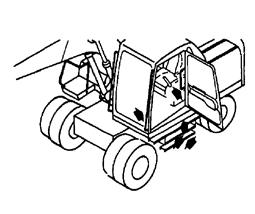
Ensure safety by always maintaining at least three-point contact of hands and feet with the handrails, steps or wheels.
Always remove any oil or mud from the handrails, steps and track shoes. If they are damaged, repair them and tighten any loose bolts.
If grasping the door handrail when mounting or dismounting or moving on the chassis steps, open and lock the door securely in the open position. Otherwise, the door may move suddenly, causing you to lose balance and fall.
FIRE PREVENTION FOR FUEL AND OIL
Fuel, oil, and antifreeze can be ignited by a flame. Fuel is particularly FLAMMABLE and can be HAZARDOUS.
Keep flames away from flammable fluids.
Stop the engine and do not smoke when refuelling.
WARNING: For reasons of safety, always follow these safety precautions..
Tighten all fuel and oil caps securely.
Refuelling and oiling should be carried out in well ventilated areas.
Keep oil and fuel in a secure place and do not allow unauthorised persons to enter.
PRECAUTIONS WHEN HANDLING AT HIGH TEMPERATURES
Immediately after operations are stopped, the engine coolant, engine oil, and hydraulic oil are at high temperatures, and are still under pressure. Attempting to remove the cap, drain the oil or water, or replace the filters may lead to serious burns. Always wait for the temperature to go down, and follow the specified procedures when carrying out these operations.
To prevent hot water from spurting out:
1. Turn engine off.
2. Allow water to cool.
3. Slowly loosen cap to relieve pressure before removing.
To prevent hot oil from spurting out:
1. Turn engine off.
2. Allow oil to cool.
3. Slowly loosen cap to relieve pressure before removing.
MACHINES FITTED WITH WHEELS
Never perform any repair work or modifications to wheel rims while the tyres are fitted, and never apply heat in the vicinity on the tyres
WARNING: Failure to follow these safety precautions may lead to a serious accident.
ASBESTOS DUST HAZARD PREVENTION
Asbestos dust can be HAZARDOUS to your health if it is inhaled.
Your Komatsu machine and genuine Komatsu spare parts do not contain any asbestos. Use only genuine Komatsu spare parts. If spare parts containing asbestos are used, the following precautions must be observed:
NEVER use compressed air for cleaning.
Use water for cleaning to keep down the dust.
Operate the machine with the wind to your back, whenever possible.
Use an approved respirator if necessary.
CRUSHING OR CUTTING PREVENTION
Do not enter, or put your hand or arm or any other part of your body between movable parts such as between the work equipment and cylinders, or between the machine and work equipment. If the work equipment is operated, the clearance will change and this may lead to serious damage or personal injury.
FIRE EXTINGUISHER AND FIRST AID KIT
Know how to use fire extinguisher (if installed).
Provide a first aid kit at the storage point.
Know what to do in the event of a fire.
Be sure you know the phone numbers of persons you should contact in case of an emergency.
PROTECTION AGAINST FALLING OR FLYING OBJECTS
If there is any danger of falling or flying objects hitting the operator, install protective guards in place to protect the operator as required for each particular situation.
For work with breakers, install a front guard on the windshield. Also, place a laminate coating sheet over the windshield.
For demolition or shear work, install a front guard on the windshield and a top guard on the cab. Also, place a laminate coating sheet over the windshield.
WARNING: For reasons of safety, always follow these safety precautions..
For work in mines, quarries, demolition, tunnels or other places where there is danger of falling rocks, put FOPS (falling object protective structure) in place. Also, place a laminate coating sheet over the windshield.
The above comments are made with regards to typical working conditions. By all means you should put on other guards if required by conditions at your particular site. For details of safety guards, please contact your Komatsu distributor.
Also, even for other types of work, if there is any danger of being hit by falling or flying objects or of objects entering the operator’s cab, select and install a guard that matches the working conditions.
(B)
(C)
(B): Top guard (C): Front guard (I)
Be sure to close the front window before commencing work.
When carrying out the above operations, make sure to keep all persons other than the operator outside the range of falling or flying objects. Be particularly sure to maintain a proper distance when carrying out shear operations.
PRECAUTIONS FOR ATTACHMENTS
When installing and using an optional attachment, read the instruction manual for the attachment and the information related to attachments in this manual.
Do not use attachments that are not authorised by Komatsu or your Komatsu distributor. Use of unauthorised attachments could create a safety problem and adversely affect the proper operation and useful life of the machine.
Any injuries, accidents, product failures resulting from the use of unauthorised attachments will not be the responsibility of Komatsu.
MACHINES WITH ACCUMULATOR
On machines equipped with an accumulator, for a short time after the engine is stopped, the work equipment will lower under its own weight when the work equipment control lever is shifted to LOWER. After the engine is stopped, set the PPC lock switch to the off position (and also lock the attachment pedal with the lock pin).
When releasing the pressure inside the work equipment circuit on machines equipped with an accumulator, follow the procedure given in the inspection and maintenance section.
Method of releasing pressure see “HANDLING THE ACCUMULATOR” on page 103.
AB30052C
WARNING: Failure to follow these safety precautions may lead to a serious accident.
The accumulator is filled with high-pressure nitrogen gas, and it is extremely dangerous if it is handled in the wrong way. Always observe the following precautions.
Never make any hole in the accumulator or expose it to flame or fire.
Do not weld anything to the accumulator.
When carrying out disassembly or maintenance of the accumulator, or when disposing of the accumulator, it is necessary to release the gas from the accumulator. A special air bleed valve is necessary for this operation, so please contact your Komatsu distributor.
Gas in accumulator, see “HANDLING THE ACCUMULATOR” on page 103.
EMERGENCY EXIT
When exit by normal means is prevented in an emergency you can get out through the emergency exit (rear window).
Pull the ring at the bottom of the window and remove strip. This will allow you to push out glass.
ROTATING BEACON (Option)
When the machine is operated on or beside a road, a rotating beacon is required to avoid a traffic accident.
Contact your Komatsu distributor to install beacon lamp.
ELECTROMAGNETIC INTERFERENCE
When this machine is operating close to a source of high electromagnetic interference, such as a radar station, some abnormal phenomena may be observed.
The display on the monitor panel may behave erratically.
The warning buzzer may sound.
These effects do not signify a malfunction and the machine will return to normal as soon as the source of interference is removed.

